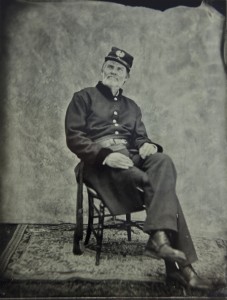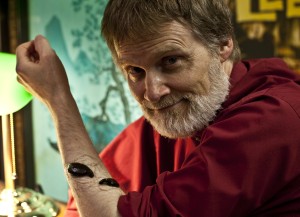Robert Hicks on “‘Straight and swift to my wounded I go’: The Reality of Civil War Medicine”
Bearing the bandages, water and sponge, Straight and swift to my wounded I go… To each and all one after another I draw near, not one do I miss.
– Walt Whitman, “The Wound Dresser”
 Despite recent commemorations of Civil War battles and leaders, the war’s medical dimension has received comparatively little public attention. America’s “good gray poet,” Walt Whitman, who volunteered in hospitals during the war, observed that “the real war will not get in the books.” For Whitman, the war’s true story was found in the hospital. The war affected every family: on average, one citizen in ten was killed, wounded, or became sick because of the war. The massive casualties made huge demands on medical practice, stimulating the reorganization of professional medicine. Faced with catastrophe, the federal medical establishment re-invented itself and created the modern hospital-centered mode of emergency care that remains the Civil War’s chief legacy to medicine. Focusing on specific wounded soldiers as lenses to understand the larger picture of the medical war, this presentation follows their experiences from the battlefield to distant general hospitals. The presentation previews the permanent exhibition of “the real war” at The College of Physicians of Philadelphia, Broken Bodies, Suffering Spirits: Injury, Death, and Healing in Civil War Philadelphia.
Despite recent commemorations of Civil War battles and leaders, the war’s medical dimension has received comparatively little public attention. America’s “good gray poet,” Walt Whitman, who volunteered in hospitals during the war, observed that “the real war will not get in the books.” For Whitman, the war’s true story was found in the hospital. The war affected every family: on average, one citizen in ten was killed, wounded, or became sick because of the war. The massive casualties made huge demands on medical practice, stimulating the reorganization of professional medicine. Faced with catastrophe, the federal medical establishment re-invented itself and created the modern hospital-centered mode of emergency care that remains the Civil War’s chief legacy to medicine. Focusing on specific wounded soldiers as lenses to understand the larger picture of the medical war, this presentation follows their experiences from the battlefield to distant general hospitals. The presentation previews the permanent exhibition of “the real war” at The College of Physicians of Philadelphia, Broken Bodies, Suffering Spirits: Injury, Death, and Healing in Civil War Philadelphia.
 Robert D. Hicks, PhD is the director of the Mütter Museum and Historical Medical Library of The College of Physicians of Philadelphia. He also directs the F. C. Wood Institute and holds the William Maul Measey Chair for the History of Medicine. Formerly, he supervised exhibits, collections, and educational outreach at the Chemical Heritage Foundation in Philadelphia. He has worked with museum-based education and exhibits for over three decades, primarily as a consultant to historic sites and museums. This work led Robert to obtain a doctorate in maritime history from the University of Exeter, United Kingdom. Concurrent with the museum consulting, Robert worked for the Commonwealth of Virginia as a senior program manager in criminal justice, providing managerial assistance throughout the state. Earlier, he performed criminal justice work in Arizona, and obtained B.A. and M.A. degrees in anthropology and archaeology at the University of Arizona. He also served as a naval officer with the U.S. Naval Security Group. His most recent book is Voyage to Jamestown: Practical Navigation in the Age of Discovery (U.S. Naval Institute Press, 2011).
Robert D. Hicks, PhD is the director of the Mütter Museum and Historical Medical Library of The College of Physicians of Philadelphia. He also directs the F. C. Wood Institute and holds the William Maul Measey Chair for the History of Medicine. Formerly, he supervised exhibits, collections, and educational outreach at the Chemical Heritage Foundation in Philadelphia. He has worked with museum-based education and exhibits for over three decades, primarily as a consultant to historic sites and museums. This work led Robert to obtain a doctorate in maritime history from the University of Exeter, United Kingdom. Concurrent with the museum consulting, Robert worked for the Commonwealth of Virginia as a senior program manager in criminal justice, providing managerial assistance throughout the state. Earlier, he performed criminal justice work in Arizona, and obtained B.A. and M.A. degrees in anthropology and archaeology at the University of Arizona. He also served as a naval officer with the U.S. Naval Security Group. His most recent book is Voyage to Jamestown: Practical Navigation in the Age of Discovery (U.S. Naval Institute Press, 2011).
